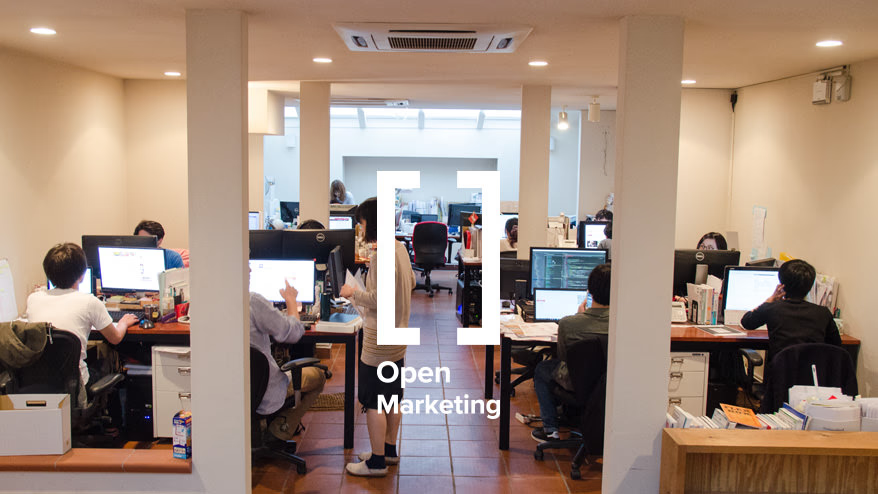みなさん、こんにちは。モノサス代表の林です。
前回は Open Marketing という考え方を自社の中に取り入れるにあたって
まず最初にはじめていただきたい「Open Action = 行動をひらく」
についてお話をしました。
その中で最も重要なポイントが、
- 企業の中でとられている行動には、たとえ小さなことでも規則性があること
- 行動の規則性をひもとくと、その会社の考え方の基礎にある価値観が見えてくること
- 顧客はそれらの行動から敏感に企業の価値観を観察し、判断していること
の3つに集約されていることについて触れ、
この中の 1 と 2 について詳しく解説しました。
今回は3つめの
3. 顧客はそれらの行動から敏感に企業の価値観を観察し、判断していること
についてお話しをしたいと思います。
Open Marketingのひとつの
きっかけを生んだプロジェクト
もう何年も前のことですが、ある学校法人のWebサイトをリニューアルしたときのことです。
その学校法人は主に通信制高校サポート校という形態の学校を運営しています。
近年注目をされるようになってきた形態の学校ですので、あまり聞きなれない方も
多いかもしれません。
通信制高校というのは昔からあるので、ご存知の方も多いと思いますが、
場所や時間に制約をうけることなく勉強することができ、
高校の卒業資格を得るための障壁を下げることができる反面、
通うべき教室がなく、課題を提出するだけで単位が取得できるため、
対面の教育ができないというデメリットがありました。
そこで通信制高校サポート校では、通信制高校に所属する生徒に対して
実際に教室を設け、授業を行うことで、そのデメリットを補う仕組みになっています。
つまりは通常の高校と同じような高校生活を送ることができるわけです。
一般的な高校と違うのは、様々な理由で普通の高校に通わないことを決断した、
もしくは決断せざるを得なかった生徒たちが多いということです。
理由はさまざまで、中には芸能活動をしているから普通の高校に通えないといった
生徒もいますが、多くは、どちらかというと、これまでの学校生活に
なんらかの理由で馴染めなかった生徒たちです。
そんな学校のWebサイトを構築するにあたって、私たちはまず
この学校に通っている生徒たちに「なぜこの学校を選んだのか」を
聞いてみることにしました。
この時は、全部で10名の生徒に話しを聞くことができました。
インタビュー後に、それらの内容を文字起こししたものを
眺めながら私は、いくつかの違和感を覚えます。
Webサイトのリニューアル目的は入学希望者を増やすことですから、
このインタビューの目的は、この学校のマーケティングの上の強みを抽出することです。
話しを聞いた生徒たちはいずれもこの学校での生活にとても満足していて、
インタビューだからと言ってお世辞を言っている感じでもない。
にも関わらず、どうも生徒たちがこの学校に入学することを決めた
きっかけというのがピンとこないのです。
もちろん「おっ!」というストーリーもいくつもあるのですが、
それはその生徒個人に起きたことであり、再現性が低い気がする。
プランニングをするうえで、嘘や誇張はしないと決めているので、
ある生徒特有の出来事をマーケティング上の強みとしては打ち出せない・・・。
当初はインタビューをもとにサイトのプランニングをすることに
していたのですが、この違和感を解決するために
学校の幹部の方々や先生たちを交えて
ワークショップをすることを提案しました。
ワークショップの中では、いくつもの大きな発見があったのですが、
その中で、今でも忘れられないエピソードがあります。
挨拶に隠されていた、学校の想い。
それは、生徒たちに
「なぜこの学校に入ろうと思ったの?」
という質問に対して、それぞれがいろいろなことを話してくれるのですが、
10人中7人ほどの生徒が
「学校見学に来た時に、先生たちが挨拶をしてくれた」
ということを話してくれました。
当初は、私も学校のみなさんも気に留めていなかったのですが、
あまりにこのことに触れている生徒が多いので、気になった私は
「ところで、多くの生徒さんが『先生たちの挨拶がよかった』と言っていますけど、
何か心あたりありますか?」
とワークショップの中で質問を投げてみたのです。
しばらくは、
「まあ、いつもやってることだからなぁ」
という声しか上がらなかったのですが、
私が何度か同じ質問を繰り返しているうちに、学校の幹部の方が
「外部から人が来たときには、だれであろうと職員室の全員が
立って挨拶することにしています」
と教えてくれました。
たしかに私たちが打ち合わせで学校を訪れた際にもそのようにされていたので、
すごいな〜と関心してはいましたが、その理由までは気になっていませんでした。
まだ生徒たちが入学を決めた理由との接点が見えなかった私は
「どうしてそんなふうにするのですか?」
と質問を重ねてみました。
しばらく沈黙がありましたが、しばらく待つことにしました。
そのあと、その場に参加していた先生が発した言葉を
私は今でも忘れることができません。
ずいぶん前のことなので正確な一言一句までは覚えていませんが、
このようなことを話してくれました。
「この学校を見学にくる生徒は何かしら学校生活に不安や、
問題を抱えてきた子たちです。
彼らは、これまでの自分の環境で直接先生からひどいことをされたという子は
ほとんどいませんが、自分が辛い目にあったり問題を抱えているときに
『先生は口では立派なことをいうくせに、自分のことを助けてくれなかった』と
不信感を持っているんです。
生徒たちからすると、『あんなに偉そうだった先生が、ここでは自分たちの手を止めて
立ち上がって挨拶をしてくれる。ここの先生たちは違うかも』と感じるんだと思います。
信頼関係の第一歩は挨拶からです。だからこの学校では、先生が生徒に
『挨拶しろ!』と教えるのではなく、先生から生徒に『こんにちは!』と
挨拶をすることから始めるんです。これまで苦い経験をしてきた彼らには、
それが伝わるんだと思います。」
この言葉を聞いた瞬間に私の中で、いろいろなものが一気につながりました。
そこからいろいろ話しを掘り下げて聞いていくと、そういった生徒たちを
受け入れるために学校がやっていることが、溢れるように出てきました。
「これはすごくいいサイトになる」
その場にいた全員がそう確信した瞬間だったと思います。
それからというもの、Webサイトにとどまらず、その学校とは
いろいろなお仕事をご一緒させていただきました。
中にはその学校の新入の先生に私が研修をするという、
不思議な機会をいただいたりもしました。
顧客は企業の何気ない行動に隠れた
価値観を常に観察している。
この学校はいわゆる私立の高校と同じような業態ですので、
年間の授業料は決して安いものではありません。
それにも関わらず、その入学の決断に、普段学校のみなさんが
なにげなく行っていた「あいさつ」が大きなきっかけを作っていたのです。
しかし、これは「あいさつをすることがマーケティング的な強みである」
ということを意味するわけではありません。
この学校を見学に訪れた入学前の生徒たちは、
例えばその学校が以前から打ち出していた
「卒業率100%」とか「大学進学実績」ではなく、
先生たちのあいさつによって、その学校の「生徒たちと向き合う姿勢」を
敏感に感じ取ったということです。
そして、生徒たちと向き合う姿勢とは、まさしくその学校の
価値観が体現されたものです。
つまり、生徒たちは、見学に訪れたの最初の一瞬に投げかけられた
あいさつひとつで、学校の価値観までをも感じ取っていたということです。
そして、それが少なからず安くはない購買行動を取らせることへの
決断の一端を担っていたのです。
私たちは、これまで自分たちがマーケティング的な強みとして
打ち出してきた数々の訴求ポイントが、企業の本質的な価値を
表現できていなかったことを痛感させられました。
そのなによりの証拠は、結果が教えてくれました。
リニューアル後、サイト訪問者が資料請求や問い合わせをしてくる
コンバージョンレートも140%に改善したのですが、それ以上に変化があったのは
その後実際に入学に至る率が200%になったことです。
最終の効果でいうと、実に280%です。
入学率が劇的に改善した理由を担当の方に聞いてみると、
以前は「とりあえず資料請求」とか「まずは一度問い合わせてみよう」
という問い合わせが多かったのが、
リニューアル後は、問い合わせをしてくる時点で
「入学したいんだけど、念のために資料がほしい」とか
「ほんとに期待どおりのものなのか確かめるために学校を実際に見てみたい」
といったモチベーションに変わっていると教えてくれました。
数々のサイトのプランニングに携わってきましたが、小規模なプロジェクトならともかく、
大きな規模のプロジェクトでここまではっきりと成果が出たのは
私にとってもはじめてのことでした。
このできごとは、私たちがOpen Marketingという考え方にいたる
大きなきっかけになりました。
競合に対して優位なポイントをキャッチーなコピーやビジュアルに載せて
訴求することよりも、その企業の価値観を、実際の行動の中から丁寧にひろいあげ
伝えていくことの方が、よい結果をもたらすのではないか。
この時にできたこの仮説を、何年にもわたり自社やクライアントのみなさまと
実践、検証しながら少しずつ形にしてきたのが Open Marketing という考え方なのです。
2回にわたってOpen[ Action ]についてお話させていただきました。
次回はOpen[ Action ]の次のステップのお話をする前に、Open Marketing がもたらす
効果について少し触れてみたいと思います。

